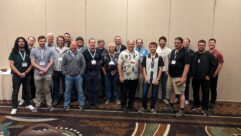Reciva.com, SHOUTcast.com and TUN3R.com: just three of the many radio portals on the Web today.
Though each has its own style, all serve the same purpose. They are one-stop-shops for thousands of Internet radio stations, both broadcast and Internet-only.
Some, like SHOUTcast.com and TUN3R.com, are designed to provide signals directly to the computer of the end-user. Others, such as Reciva.com, support Web streaming and serve Internet-connected radio receivers to provide classic radio-style tuning without a PC.
Big questions
For broadcasters, there are two big questions about radio portals. The first: “How do I get listed?” The second: “How do I make my station stand out so that I attract the audience I am seeking?”
There are many ways for broadcasters to get listed with radio portals. The most direct way is to go to a radio portal and submit their stations for carriage.
“Third-party broadcasters can add their stations to the SHOUTcast directory by downloading and using the SHOUTcast broadcaster tools, which are available on SHOUTcast.com,” said SHOUTcast Vice President Lisa Namerow.
All three radio portals also let broadcasters — and listeners — submit URLs for audio streams.
The portal operator then checks the submissions to see if each stream is actually working — Reciva.com uses software that does this automatically — and reviews them against the existing station line up of the portal to avoid duplication.
“We must get 100 submissions a week for BBC,” said Matt Shortt, Reciva marketing director.
Key elements
The stream must also be of sufficient audio quality to win a spot on the portal, said TUN3R.com GM Neil Hepburn. “We prefer stations that are streaming at 128 kbps or better.”
Format is also an issue. According to Hepburn, despite the claims of device manufacturers, “far too many” streaming formats are not as well supported by hardware and software devices.
“That is why we prefer broadcasters using the MP3 format, as opposed to WMA or Real, because MP3 is compatible with most audio players,” said Hepburn.
However, just because a station meets the standards for listing does not mean it will necessarily be chosen. The reason is that radio portals provide value to their users by short-circuiting the need to personally scan through thousands of Internet radio stations.
“People come to us looking for the best stations in each genre and niche,” said Shortt. “As a result, we pick and choose from all the listings we receive to provide the best line up we can — this means that many stations are purposely left out.”
Genre and niche are key elements of radio portal site layout. Though it is possible to select broadcasts by geographic location, portals tend to emphasize the specific genres and niches that stations fit into.
Fewer competitors
“With so many mediocre broadcasters playing the same kind of music, our mission is to find the best, most representative and distinctive webcasters in each genre,” said Hepburn.
“The model is akin to satellite radio, in the sense that we try to provide a wide range of listening options in a limited space,” said Hepburn. “Since most people really do not want to search thousands of stations themselves, they like us to do the legwork for them.”
So, if you want a radio portal to choose your station, it has to be truly good at what it does. If your station is niche-oriented, so much the better. There are fewer competitors in the smooth jazz category than there are in the CHR/top 40 hit music format.
Once your station has been listed, the next step is to make sure people choose it. This is where promotion comes in.
“SHOUTcast currently ranks stations based on popularity and number of listeners,” said Namerow. “The more popular a station, the higher it is in the search results — therefore, the best way for broadcasters to reach a larger set of listeners on SHOUTcast is to promote its station listings on SHOUTcast.”
On-air promotion also makes a difference, as does promoting the radio portal listings of your station on your own Web site.
New twist
With its ability to reconfigure all Reciva-compatible receivers on the fly, Reciva.com has added a new twist to forced tuning, Internet style.
“For a fee, we can instruct radios using our software — including receivers made by Acoustic Energy, C. Crane Co., Grace Digital, Sangean and Tangent — to preferentially list whatever stations we tell them to,” said Shortt.
“For instance, Clear Channel can arrange to have U.S.-based Internet radios automatically list their stations first by genre or location — the listener still gets to make their own choices, but we can decide what they see first.”
Radio portals are a fast, convenient way for listeners to find the kind of music they are looking for on the Web. This is why getting listed on radio portals now is important for webcasters, whether broadcast or Internet-only.
After all, just because your station is not listed does not mean that your competition is not!










